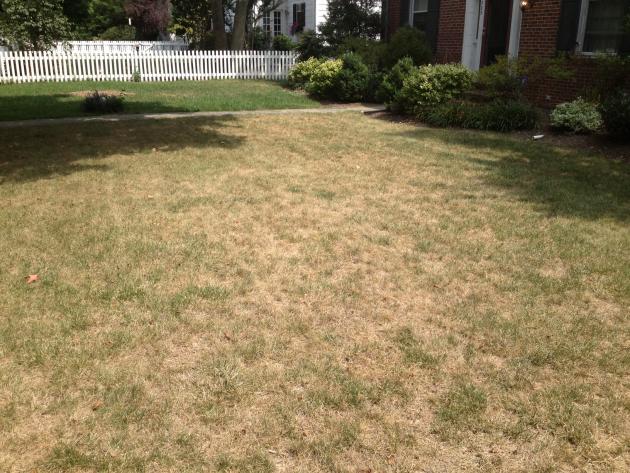Seven Ways to Help a Drought-Stressed Lawn
Submitted By: Greg Drake II, County Extension Agent for Agriculture and Natural Resources
Source: Gregg Munshaw, Plant and Soil Sciences Extension Associate Professor
Kentucky’s been pretty dry the past few weeks. September and October are usually our driest months. Even if we get a heavy rainfall in the near future, it won’t completely alleviate drought symptoms.
When a lawn becomes excessively dry, the soil surface develops some water repellency that prevents water from soaking in during a quick, hard rain event.
Here are some things you can do to help your thirsty grass and hopefully avoid having to completely reseed your lawn.
1.
Water every other day or every third day until good, soaking rains begin.
2.
Apply about two-thirds of an inch of water each time. You can check this by probing the soil with a knife or screwdriver to determine if the soil is wet 2 to 3 inches deep.
3.
Water in the early morning to help reduce diseases, remove dew and reduce evaporative water loss.
4.
Water areas that have the earliest browning first. These are often on southern or western facing slopes or areas with heavy clay soils, very compacted soil or rocks near the surface.
5.
If possible, don’t mow a drought-stricken yard until you can water it or you know a soaking rain is on the way. Weeds are still growing and flowering during summer droughts. Wait for the rain, then mow off the weeds.
6.
Don’t apply herbicides during a summer drought. They won’t work when weeds are suffering and can damage drought-stressed grass more than weeds.
7.
Wait for a soaking rain before applying nitrogen to the lawn in the fall. Nitrogen can greatly improve a lawn’s drought recovery.
For more information, contact the Butler County Extension Office at 102 Parkway Lane, Morgantown or call 270-526-3767.
Educational programs of the Cooperative Extension Service serve all people regardless of economic or social status and will not discriminate on the basis of race, color, ethnic origin, national origin, creed, religion, political belief, sex, sexual orientation, gender identity, gender expressions, pregnancy, marital status, genetic information, age, veteran status, or physical or mental disability.



























